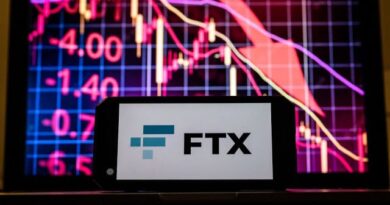Bitcoin’s next step is accessibility for all: Scaramucci
Yahoo Finance Live’s Brad Smith joins Anthony Scaramucci at Bitcoin Investor Day for a conversation about the next inflection point for the cryptocurrency.
Making bitcoin (BTC-USD) more accessible is the next step for the cryptocurrency, Scaramucci says. He points to the growth of spot bitcoin ETFs, following the SEC’s approval of 11 ETF issuers in January. “Institutions are comfortable,” he notes, and with bitcoin’s halving on the horizon, “that should push the price up a lot.”
Record outflows from Grayscale’s Bitcoin Trust (GBTC) may shake investor confidence, but Scaramucci claims bankruptcy trustees at Celsius and FTX are behind the sell-off. Bitcoin is set to experience record growth as a new generation embraces the digital currency, Scaramucci says; he compares crypto adoption to millennials’ tech savvy, and notes it will become a key part of the election conversation: both sides of the political aisle will need to be “pro-coiners…or it may otherwise cost them an election.”
AI has also seen a market rally with questionable momentum. As in the case of bitcoin, Scaramucci advises that investors observe long-term trends: “If you just hold it, you’ll be okay. That’s my message to the AI people.”
For more expert insight and the latest market action, click here to watch this full episode of Yahoo Finance Live.
Editor’s note: This article was written by Gabriel Roy.
Video Transcript
BRAD SMITH: We’re back here live at Bitcoin Investor Day. I’m here with Anthony Scaramucci, the man who needs no introduction, of course, of SkyBridge Capital fame. Anthony, thanks so much for taking some time.
ANTHONY SCARAMUCCI: Good to be here, Brad. Thank you.
BRAD SMITH: Absolutely. OK, we’ve got a big day, a lot of energy here. What is– and this is what a lot of people are trying to figure out– here at this conference and even beyond? What is the next inflection point for cryptocurrency and for Bitcoin that you’re to try?
ANTHONY SCARAMUCCI: Well, firstly, I want to say is congratulations to Anthony Pompliano for the conference because this is layered. You have individual investors here, big name institutional investors. And I think what the Pomp is trying to do is make this accessible to everybody. And so I really do believe that’s the next step.
Story continues
We had a retail explosion in Bitcoin demand in the beginning. It’s now flipped over where institutions are comfortable because they have an ETF that they can purchase and greenlighted by the SEC. And you have the halving coming up.
And so at some point, late April, call it around April 20 or the 22, you’ll cut the supply of new Bitcoin entering into the market by half. You’ll start spitting out 450 Bitcoin a day. And if you have this pace of demand, that should push the price up a lot. But remember, I would have never guessed that Grayscale would have been cut in half two months into the Bitcoin ETF approval.
BRAD SMITH: What do you think is behind that right now? Because that’s what we’re tracking.
ANTHONY SCARAMUCCI: I think it’s a combination of things. I think bankruptcy trustees at places like Celsius, at places like FTX, Genesis, we could name them all, are flooding the market with their GBTC. And they’re just trying to get a price above 60 so they’re flooding the market.
BRAD SMITH: Is that what you’ve heard that FTX is liquidating–
[INTERPOSING VOICES]
ANTHONY SCARAMUCCI: I think FTX is already out. I think they sold a few weeks ago. But these other guys are still selling.
And then I think you have the garden-variety person that’s been in GBTC who accepted the 2% fee because there was no other game in town. And now they’re like, wait a minute, I can go to a 21 basis point fee. So if it’s an IRA, 100% they’re moving that day. And then it’s just a question of how much taxes do you want to pay for taxable accounts. So you could have another 15 days of selling before you see this thing calm down.
BRAD SMITH: There was an interesting stat that Mike Novogratz of Galaxy brought up during his fireside chat and it was about the great wealth transfer that we’re set to see–
ANTHONY SCARAMUCCI: Yeah.
BRAD SMITH: –in the next few years here. $84 trillion in wealth owned by US baby boomers and they largely invest through registered investment advisors and whatnot. If we see a great wealth transfer, what does that hold for Bitcoin in the near future from your perspective?
ANTHONY SCARAMUCCI: So I’m going to give you an example from web one. I was 30 when the Netscape browser came out in 1995 and I was old. We were late adopters to things like email, web browsing, purchasing things on the net, and accessing news. But somebody that was 10 or 15 was gung ho. That’s Bitcoin.
[COUGHS]
Excuse me. So somebody today 45s, a little bit of Bitcoin. But somebody 25, a lot of Bitcoin. So in the next 10 years, I see it like a big python where the Bitcoin is going to get absorbed into the python. There’ll be a big bump up in Bitcoin demand and that’s coming inside of the next decade.
This is why people like Michael Novogratz or Cathie Wood, they see a $1 million Bitcoin. And by the way, let me just remind everybody, a $1 million Bitcoin is a $21 trillion marketplace. Gold is $14, $15. They’re suggesting that Bitcoin should trade to 150% of gold’s overall market cap.
Let’s say they’re wrong. Let’s say it trades to its market cap or half of what they’re saying. That’s still inside of the ballpark of what I would consider digital gold. Now, if somebody like Saifedean Ammous is right, you could end up in a situation of hyper fiat currency inflation where people start relying more on Bitcoin because of the hard nature of the asset.
BRAD SMITH: Do you think then, with that in mind and the interest among younger potential wealth holders in the future, that Bitcoin finds itself in the throes of this election conversation in 2024?
ANTHONY SCARAMUCCI: I think it already is. I think we’re learning that Elizabeth Warren’s team is asking other senators to put out statements on behalf of her because she’s afraid to be at the tip of the spear of the anti-crypto movement anymore. I think they’re learning that there’s probably 45-ish million wallets in the United States and many of those people are eligible voters. And many of those people won’t vote. And so I think eventually you’re going to end up in a situation where both sides have to be pro-coiners, pro-crypto, pro-digital property, otherwise it could cost them an election.
BRAD SMITH: Does that also mean then that we see more of a gravitation towards central bank digital currencies if there is a bipartisan effort that moves forward?
ANTHONY SCARAMUCCI: Yes. So it’s a good question. So we looked at that. That happened on a Wednesday when I was in the White House. The reason I know that, I was only there for one Wednesday.
And we had a white paper come out in 2017 talking about central bank digital currency. Mnuchin tabled it. I think Janet Yellen will table it. Question is, will the next administration– and I think it’ll likely be a Biden administration– will they table it?
And it really depends on what our competitors are doing. The Chinese have a digital currency. If there’s a euro digital currency, I think it will be impossible for the United States not to have a version of one or to really promote something like Circle, which is not a central bank digital currency, but is a stablecoin on the net.
BRAD SMITH: Why then wouldn’t we see a consortium of central banks create their own cross-functional digital currency?
ANTHONY SCARAMUCCI: It’s a good question. And so I know there’s libertarians that are against it. If you’re asking my opinion, I’m not for it. But that doesn’t mean it won’t happen.
I think there’s an inevitability to this. It’s sort of like what Elon Musk says about AI. He doesn’t like elements of it, but there’s an inevitability. And so I think it’ll eventually happen. I just don’t know when.
BRAD SMITH: And then just lastly while we have you. You mentioned Elon Musk. I mean, you track a range of different asset types.
And what we’re seeing in the equity market right now, there’s a fallout from some of the companies that were once in the Magnificent Seven. There’s, of course, now a checking even some of the AI plays that are out there. How much more juice do you think this AI trade has left in them?
ANTHONY SCARAMUCCI: It’s a really good question. And obviously, nobody knows the answer to that. But here’s what I would say, if the Fed starts cutting rates, they’re indicating that they’ll do three rate cuts this year, I think that gives a little bit of buoyancy to the market. Those stocks probably are overbought at this moment so they could have a 10% or 15% correction.
But what I tell clients, so what? All of these things for three to five year play, hold them for seven years. If you hold something like Bitcoin for four years, there’s not one person in a rolling four-year period of time that hasn’t made money if you just stayed in the asset.
And so I bought my first Bitcoin in 2020 October. It went up a lot in ’21 and I looked like a genius. It went down a lot in ’22, I looked like a dummy. And now I’m somewhere in the middle because it went up a lot again.
But if you just hold it, you’ll be OK. That’s my message to the AI people. That’s my message to the Magnificent Seven. They’re probably overbought.
You know, I don’t like the concentration of those 7 stocks versus the other 493 in the S&P 500. That’s happened before and that usually spells a near-term correction for the overall markets. But you got the Fed cutting rates, you got a very strong economy. So I wouldn’t want to be left out. It’s just too hard to predict.
BRAD SMITH: Anthony, thanks so much for taking the time.
ANTHONY SCARAMUCCI: Great to be on. Thank you.
BRAD SMITH: Absolutely.



